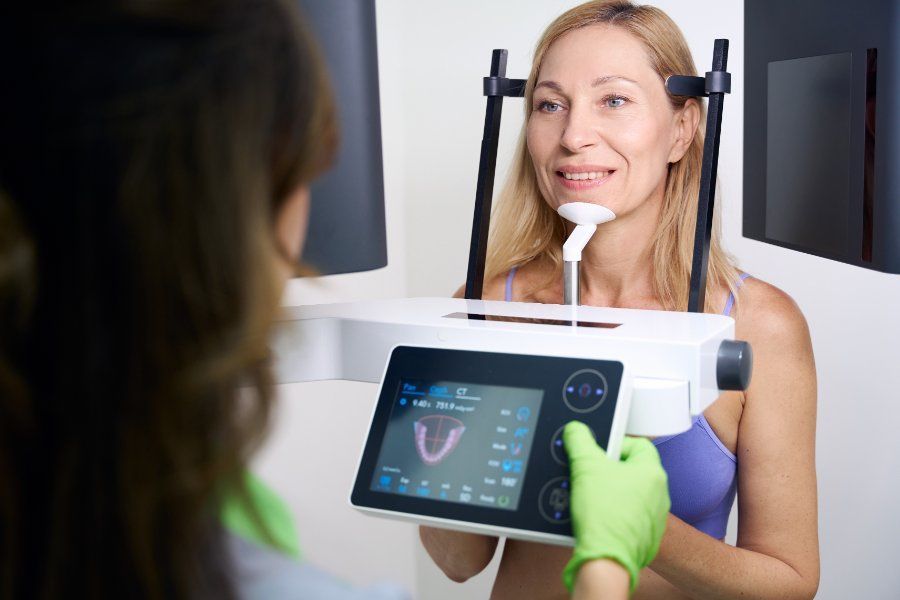3D Cone-Beam Imaging

Our in-house 3D Cone-Beam CT (CBCT) scanner provides incredibly detailed, three-dimensional views of your teeth, jawbone, nerves, and sinuses. This depth of information is typically not seen in traditional X-rays, and CBCT offers a cutting-edge means to view details that were previously unavailable.
This advanced imaging technology allows Dr. Kostas to plan complex treatments with unparalleled accuracy, leading to safer procedures and more predictable, successful outcomes. Experience the cutting edge of dental diagnostics at Dental Arts of Cherry Hills.
What is 3D Cone-Beam Imaging (CBCT)
For decades, dentists relied on flat, two-dimensional X-rays to see below the surface of your teeth and gums. 3D Cone-Beam Computed Tomography (CBCT) represents a significant leap forward in dental imaging technology.
In a single, quick scan, our CBCT system captures hundreds of images from various angles of your teeth, bones, and mouth. Sophisticated software then reconstructs these images into a comprehensive, high-resolution 3D model of your facial skeleton.
This allows Dr. Kostas to view your anatomy slice-by-slice, in any direction, providing unparalleled clarity essential for diagnosing conditions and planning intricate procedures.
Advantages of Our In-House CBCT Technology
This advanced 3D dental imaging technology offers numerous benefits for your care.
- It helps visualize nerve pathways, sinus boundaries, bone density and volume, intricate root canal systems, and other critical structures often invisible on standard 2D X-rays.
- It helps to plan for procedures like dental implant placement, ensuring the ideal position for stability and safety, and avoiding vital structures.
- Knowing the precise anatomy before treatment begins minimizes surprises, reduces potential risks, and leads to more predictable surgical outcomes.
- It provides a complete view of your teeth, jaws, joints, and airway in one efficient scan, aiding in complex diagnoses.
- While using advanced X-ray technology, CBCT scans use significantly less radiation than traditional medical CT scans, focusing precisely on the dental structures needed. We adhere strictly to the ALARA principle (As Low As Reasonably Achievable).
- The scan itself is fast (typically under a minute), non-invasive, and performed comfortably while you sit or stand.
How the CBCT Works
No special preparation is typically required for your scan.
- You'll be positioned comfortably, either sitting or standing, within the open CBCT unit.
- You'll be asked to remain still for just a few seconds as the scanner arm rotates smoothly around your head.
- The scan is completely painless and non-invasive.
- Hundreds of images are captured digitally and instantly sent to our computer for reconstruction into a detailed 3D model, ready for Dr. Kostas to analyze.
Having 3D Cone-Beam Imaging technology in-house means greater convenience and efficiency for you. However, this is only part of the equation. The true value lies in Dr. Kostas’ extensive training and expertise in interpreting these complex 3D scans.
He analyzes the detailed anatomical information to make highly accurate diagnoses and customized treatment plans tailored precisely to your needs. This technology also allows Dr. Kostas to visually show you the findings and explain your recommended treatment plan effectively.
How the CBCT Results Are Used
The detailed information provided by CBCT scans is invaluable for planning and executing a range of complex dental procedures with the highest degree of precision.
- Dental Implant Planning: Evaluating bone quality and quantity, mapping nerve paths and sinus locations precisely for safe, successful implant planning and placement
- Complex Dental Surgeries: Visualizing complex root structures, identifying hidden canals or fractures, and planning dental surgeries
- Difficult Extractions: Assessing the position of impacted teeth for extraction (especially wisdom teeth) relative to sensitive nerves and sinus cavities accurately
- Orthodontic Evaluation: Assessing jaw relationships, tooth positioning, and potential airway issues for comprehensive treatment planning
- Pathology Detection: Identifying and evaluating the extent of cysts, tumors, or other abnormalities within the jawbones
The easy access to our in-house dental lab ensures that the results of the CBCT scan can be implemented in treatment planning and execution with ease and precision.
Advanced 3D Imaging for Dental Procedures in Englewood, CO
Precise imaging is the foundation of exceptional dental care, especially for complex restorative and surgical needs. Whether you require dental implants or other advanced procedures, trust the practice that invests in leading technology for your safety and success.
Visit Dental Arts of Cherry Hills to discover the difference that 3D Cone-Beam Imaging can make in your treatment planning.
To schedule a consultation, please call us at 720-868-8092 or request an appointment online. We’re committed to helping you reclaim your natural smile.
FAQs About 3D Cone-Beam Imaging
Is a CBCT scan safe? How much radiation is involved?
CBCT scans use ionizing radiation, but the dose is significantly lower than conventional medical CT scans and optimized specifically for dental structures. We strictly follow safety protocols (ALARA) to use the lowest necessary dose for diagnostic purposes. The benefits of accurate diagnosis and safer treatment planning typically far outweigh the minimal risk.
Why do I need a 3D scan instead of a regular X-ray?
While standard 2D X-rays are excellent for routine checks, they cannot show the depth and precise spatial relationships of anatomical structures. For complex procedures like implant placement or evaluating impacted teeth near nerves, the detailed 3D view provided by a CBCT scan is essential for safety and accuracy.
Will my insurance cover a CBCT scan?
Coverage varies depending on your specific dental or medical insurance plan and the reason for the scan (medical/dental necessity). We can help you determine potential coverage.
How long does the actual scan take?
The image capture process is very quick, usually taking less than 30 seconds of rotation time.
Do I need to do anything special to prepare for the scan?
Generally, no special preparation is needed. We may ask you to remove glasses, jewelry, or removable dental appliances before the scan.
